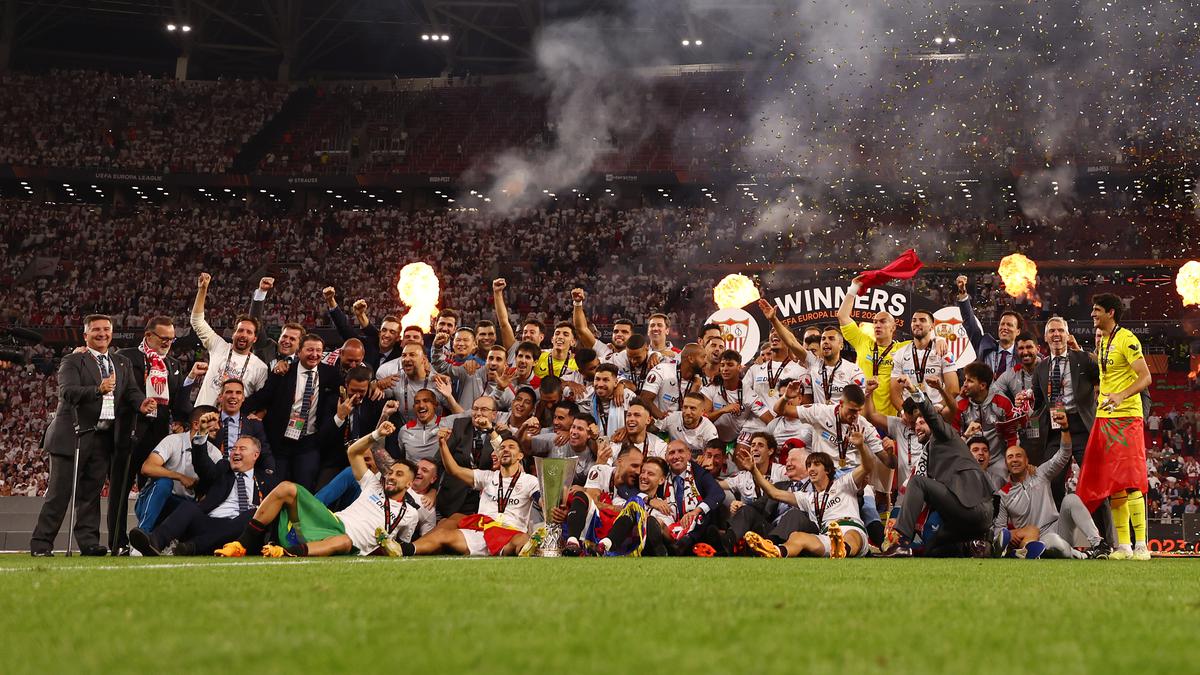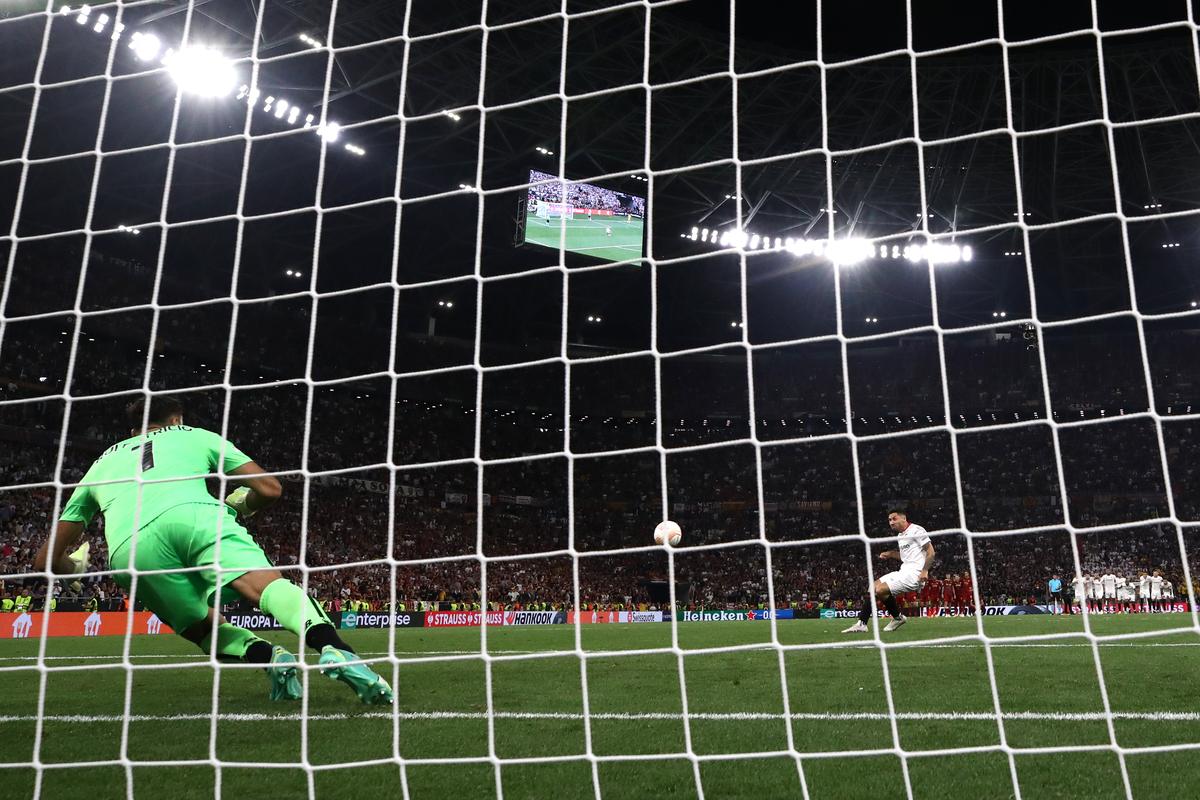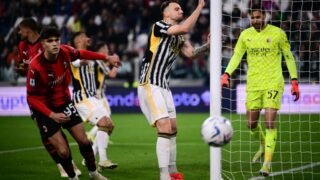
Sevilla and the Europa League: An epic saga of blood, sweat, tears and more
Sometimes, a perfect script lays in anticipation, waiting to be narrated to the world. One, which has all the usual elements that would enrapture audiences. The highs, the lows, the struggle and eventually, the triumph. Some stories never get old, no matter how many times they are repeated.
The romance between Sevilla and the Europa League isn’t a recent occurrence. Before Thursday’s final against Roma, it had already won the title six times, with its first coming in 2006. But the record-extending seventh title will go down as a special win in the annals of Europa League history because of the fight the team showed.
Leading up to the 2022-23 Europa League title clash, a record was meant to be broken one way or another. In one corner was Sevilla, which has never lost a final. On the other side was Roma, managed by Jose Mourinho, who had never lost a European final in his illustrious managerial career. The buildup was perfect.
It was a long duel, but in the end, Sevilla landed the knockout blow.
With Roma’s Paulo Dybala scoring in the first half and Gianluca Mancini putting the ball inside his own net in the second, the scores were level at 1-1 after 120 minutes of football. The match went to penalties.
In the shootout, Roma succumbed to the pressure first. The night went from bad to worse for Mancini, who saw his spot-kick saved by Yassine Bounou’s outstretched leg. With Ivan Rakitic scoring the next penalty, the pressure was on Roger Ibanez to keep his team alive. Unfortunately for him, the post stood as a hindrance.
That there’s a certain aura associated between Sevilla and the Europa League, was proven by how the Andalusians won the title. All eyes were on Gonzalo Montiel as he lined up to take the deciding penalty – the same who immortalised Lionel Messi’s Argentina by scoring the winning spot-kick against France in the final of the Qatar World Cup.

Gonzalo Montiel of Sevilla FC has the fourth penalty saved by Rui Patricio of AS Roma, which was later re-taken after a VAR check during the UEFA Europa League 2022/23 final.
| Photo Credit:
Getty Images
Montiel hit the post, and it seemed like his moment was gone, but he was given a lifeline as Roma keeper Rui Patricio had come off his line during his first kick. His second attempt was met with a roar from the fans donning white in the stands. Sevilla was champion again, beating Roma 4-1 on penalties.
From the crevice to the summit
When Jose Luis Mendilibar took over the reins at Sevilla from Jorge Sampaoli in March, the club was 14th in the La Liga standings, just two points above the 18th-placed Valencia, which was in the first relegation spot at the time.
While a third-place finish in its Champions League group led to Sevilla being demoted to a competition wherein it has been most successful, trophies were a far cry from Mendilibar’s list of priorities. Damage limitation and survival in Spain’s top flight were of paramount interest. At that point, it would have been Pollyannaish of somebody to pin their hopes of a title on Sevilla. But this very reason makes its title run all the more special.
In its first six title wins (between 2006 to 2020), every time Sevilla tasted Europa success, it had momentum in its side throughout the entire season. Apart from 2016, when the club won the Europa title the other five times , it had finished among the top five teams in the league. This season, that entire narrative went for a toss. Down and out, when survival in La Liga became a matter of concern, winning a major European title is a phenomenal feat.
To put things into context, Sevilla is 11th in the league table, with one more match left to play. If not for this Europa win, Mendilibar’s men would not be in any European competition next season. But now, they will again battle with Europe’s best in the Champions League next season.
Sometimes racing past, sometimes edging through
Sevilla’s road to the final wasn’t elementary by any means. After a Round of 32-win against PSV, post its Champions League demotion, it set up a Round of 16-clash with Turkish club Fenerbahce S.K. A 2-0 win at home proved crucial, as the champion lost 1-0 in its away fixture. With a 2-1 aggregate lead, it set up a quarterfinal tie against 2017 champion Manchester United.
Half-time into the first-leg against United, and everyone was ready to bid Sevilla goodbye. The rampant Red Devils, aided by a Marcel Sabitzer brace, led 2-0 at the break of the first-leg. But it is just something about this competition that makes Sevilla strive till the final whistle. Two late goals in the second-half of the first-leg and then a blistering 3-0 win at home led to a 5-2 aggregate win and a semifinal date with Juventus.
The semifinal clash took Mendilibar’s men till the distance. Youssef En-Nesyri scored first at Juventus’ home, and Sevilla would have come away with a 1-0 win if not for Federico Gatti’s equaliser in the 97th minute. The second-leg was laden with drama as well. Dusan Vlahovic scored first for an away lead, but Suso was quick to equalise six minutes later. In extra-time, Erik Lamela sent the Ramon Sanchez Pizjuan Stadium into a frenzy with a winner in the 95th minute.
A football match has so many layers. While focusing on the main story, it is easy to forget the many footnotes that are no less special. Thursday’s final was no different.
It was beautiful when Jesus Navas celebrated his seventh Europa title at the age of 37, having been with Sevilla when it first won in 2006. It was inspiring when Dybala braved injury to start for his team and score. It was heartwarming when Jose Mourinho gifted his runner-up medal to a young fan. And, when Sevilla gave a ‘Guard of Honour’ to the Roma players as they went up to collect their medals, it symbolised the very essence of why football is known as the ‘beautiful game.’










